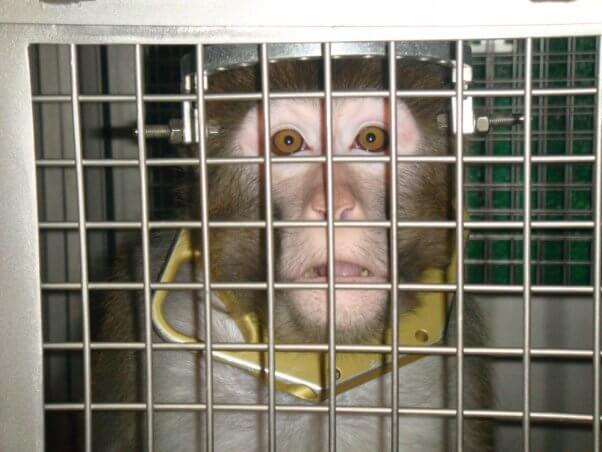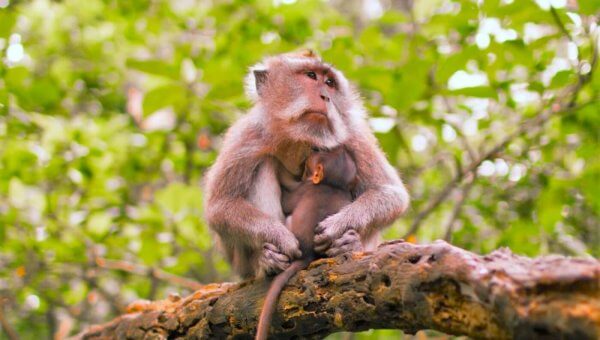PETA Finds 255 Safety Violations at Primate Facilities, Pushes Feds to Investigate
Update (July 29, 2024): PETA has revealed shocking numbers of unaddressed workplace safety violations at the University of Washington’s monkey-breeding facility in Mesa, Arizona, after analyzing hundreds of pages of reports to the university’s safety committees.
Workers routinely endure accidental needle pokes and bites and scratches from stressed monkeys and are sometimes splashed in the eyes with fluids or injured by contaminated equipment. This is extremely dangerous.
PETA has now filed a complaint with the Arizona Division of Occupational Safety and Health, urging it to investigate a whopping 49 workplace safety violations at the Mesa facility in just a three-year span.
The facility, tucked away on tribal land, cages between 400 and 500 monkeys at any one time, making its safety violations a public health concern. The highly contagious and potentially lethal herpes B virus is known to circulate among monkeys imprisoned there, but safety protocols there are even more lax than they are at the university’s primate research center in Seattle. Herpes B–exposed workers there are whisked off to an emergency room, but this precaution isn’t always followed at the Mesa facility.
This Arizona complaint follows one we made to the U.S. Department of Agriculture, urging a federal investigation into the hundreds of worker safety and animal welfare violations in Mesa and Seattle. (See below.)
Please take action by urging the University of Washington’s leadership to close the primate center immediately and release the imprisoned monkeys to appropriate sanctuaries:
PETA is calling for a federal investigation after uncovering documentation showing hundreds of worker safety violations at the University of Washington’s Washington National Primate Research Center in Seattle and its breeding facility in Mesa, Arizona. Of the 255 violations, 75 may have also violated the federal Animal Welfare Act but were apparently never reported to authorities as required.
In a complaint filed with the U.S. Department of Agriculture, PETA is pushing the agency to issue citations, as appropriate, and recommending civil and/or criminal penalties through the U.S. Department of Justice.
Fecal Matter, Deadly Virus, Injuries, and Inept Staff
After carefully combing through the damning documentation, PETA found that the university’s safety committee had detailed multiple incidents that it blamed on poor training, inadequate staffing, equipment failures, and stressed staff who rushed through procedures—all of which also contributed to an unsafe work environment.
Numerous staff members required medical treatment and emergency room visits, and a primate center representative admitted that “virtually everyone … gets ill at some point in their first six months” from contact with dangerous infectious diseases and “aerosolized fecal matter.”

Other reported incidents—which included bites, scratches, and injuries from being accidentally poked with needles, being splashed in the eyes, or using contaminated equipment—all increased the risk of transmittable diseases. They include the following:
- Seattle workers who were bitten, scratched, or splashed—fearing exposure to the often-fatal herpes B virus—were sent to the university’s emergency room and treated with antiviral medications.
- A worker who was bitten and sustained a bloodied bruise after reaching into a cage that confined two monkeys.
- Another worker who was bitten by a monkey required emergency room treatment. The “employee was rushing and not being cautious enough; there is also a lot of activity in the room which may have stressed the animal.”
- An employee poked themself with a needle while rushing when uncapping a syringe.
- A crowbar fell onto a veterinarian’s head during a procedure, causing a gash.
- An employee was injured after grabbing and restraining a 35-pound monkey who “jumped off the [procedure] table.”
- An employee was slashed by a monkey’s canine teeth as they tried to fasten the animal into a restraint chair.
- A stressed infant monkey bit an employee when other workers entered the room.
- An employee was bitten when they pushed a tube down a monkey’s throat, gagging the animal.
- A caged monkey reached under a worker’s face shield and mask, scratching them.
- A “displeased” monkey bit a staffer’s calf and knee.
The primate center is a violations overachiever. It’s just one of 32 departments that make up the safety committee, yet it consistently reports far more incidents than any other department. It was responsible for a whopping 61% of reported incidents in 2021, 49% of them in 2022, and 44% of them in 2023.
What You Can Do
Untrained staff endanger animals and themselves. Monkeys at the primate center have died from strangulation, starvation, dehydration, veterinary error, and choking on their own vomit. These safety issues are further evidence that the facility is a dangerous place with inadequate staffing and training that make the lives of the extremely stressed primates confined there even more miserable.
Please take action by urging the University of Washington’s leadership to close the primate center immediately and release the imprisoned monkeys to appropriate sanctuaries:


